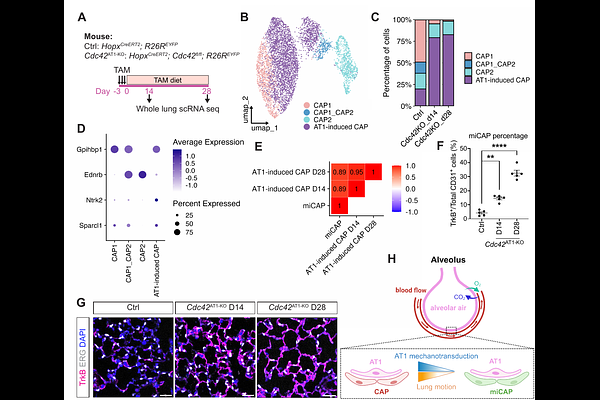Mechanical force-mediated cellular crosstalk maintains the integrity of the lung gas exchange niche

Mechanical force-mediated cellular crosstalk maintains the integrity of the lung gas exchange niche
Shen, C.; Morley, M. P.; Zhao, G.; Jones, D. L.; Schaefer, S. E.; Planer, J. D.; Chembazhi, U. V.; Kim, M.; Ying, Y.; Zhou, S.; Li, S.; Hallquist, H.; Lange, A.; Basil, M. C.; Morrisey, E. E.
AbstractThe lungs undergo constant mechanical strain as part of their function. Within the lung alveoli, alveolar epithelial type 1 (AT1) cells and associated capillary endothelial cells (CAP) comprise the minimal gas exchange unit. How cells in the alveolar niche respond to respiration-mediated mechanical forces remains poorly understood. Using a reversible bronchial ligation model to control unilateral lung motion in mice, we show that blocking respiratory movements in the lungs leads to transcriptional changes in signaling involved in dysfunctional lung repair. Inhibited lung motion induces the emergence of a permanent, distinct mechanically induced capillary endothelial CAP or (miCAP) state, defined by expression of Ntrk2. Importantly, the emergence of miCAPs requires attenuated mechanotransduction signaling in adjacent AT1 cells. Normalization of lung motion after respiratory blockade spontaneously activates the proliferation of miCAPs, while other transcriptional changes are maintained. Collectively, these results reveal a mechano-responsive endothelial cell state induced by respiration mechanics and mechanosensing in adjacent AT1 cells, revealing the distinct impact of mechanical strain on the lung gas exchange interface.